I’d like to celebrate the first anniversary of my blog by writing about something that interests me, scriptwriting. I’d better make some things clear about the following list.
These are the top 5 scripts from movies about which I’ve blogged, not my top 5 screenplays ever. They’re not even my top 5 screenplay adaptations.
These are the top 5 scripts from movies specifically about which I’ve blogged. I considered doing scripts from filmed plays and television too, but this seemed simpler.[1]If I had, the scripts for pretty much every episode of The Storyteller would have to be included, but I’m not sure about the libretto for the 2000 staging of Peter Pan. I love it more than the … Continue reading
These are the top 5 scripts about which I’ve blogged, not the top 5 movies. Sometimes a movie will have a great script, but it won’t have a great cast or a great soundtrack or a great visual style. If you want to know my opinions about any of these films as a whole, click on the links I’ve included and be aware that some of them are to posts about two movies, so you have to read carefully to find the one with the top script.
This was an interesting list to make. Previously I would have said that the best adaptations are those in which you can still hear the voice of the original author. But my favorites have turned out to be more like duets where both the original author’s voice and the screenwriter’s voice can be heard, complementing each other.
Honorable Mentions: Love and Friendship (2016) by Whit Stillman and Freaky Friday (1976) by Mary Rodgers
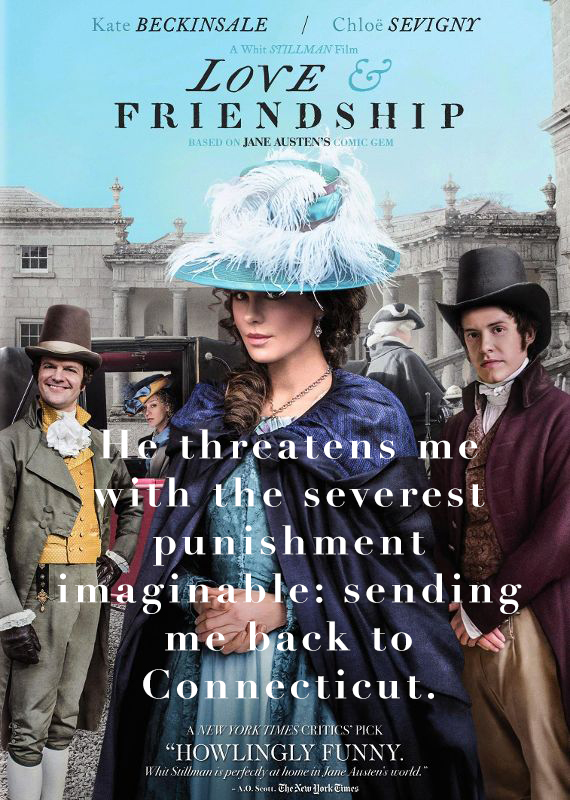
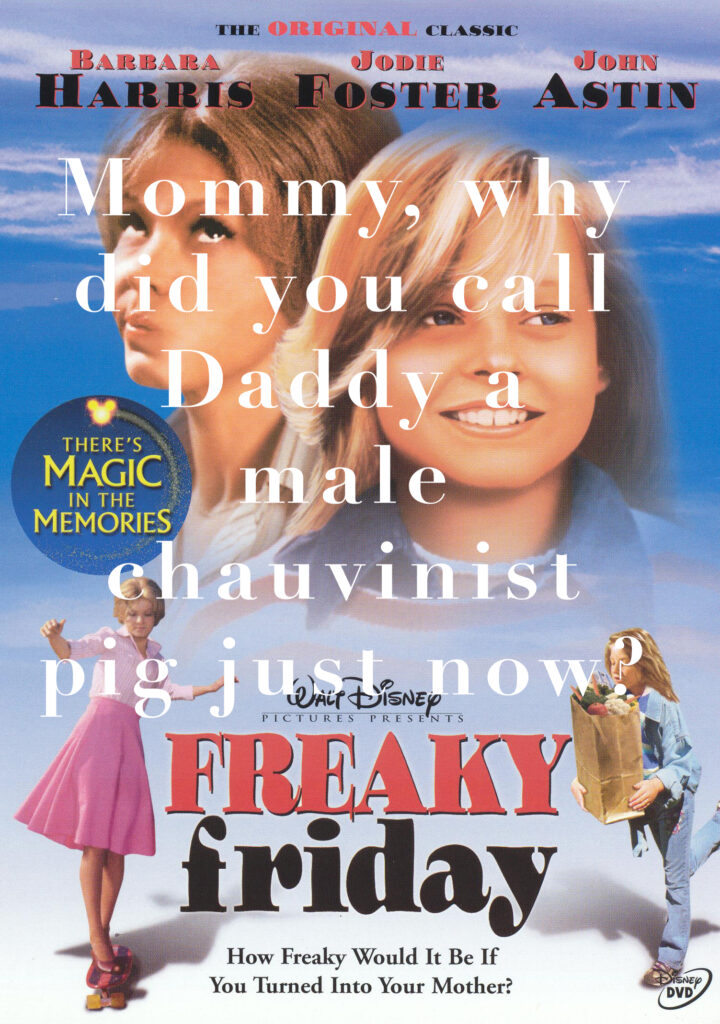
Of all the Jane Austen adaptations out there, Love and Friendship just might do the best job of capturing the tone and style of her writing, though it does suffer from being a bit repetitive. (Count how many times Sir James is described as being “no Solomon.”) It has too many dramatic problems for it to be one of my favorites, but it’s so quotable it had to be included on this list somehow.[2]In Stillman’s defense, the dramatic problems come from the source material, Lady Susan, though another adaptation might have worked around them better. In Austen’s defense, Lady Susan … Continue reading
I may have a number of adaptation issues with Freaky Friday, mainly involving the climax, but it perfectly captures the style of the book’s prose in a way no other adaptation does. Not that that’s a big achievement since they were written by the same person. If I didn’t include it however, this post would give the impression I only love hoity toity Classics with a capital C and while I don’t find this one as interesting as the others on this list, I do consider it great writing of its kind.
5. Peter Pan (2003) by P. J. Hogan and Michael Goldenberg
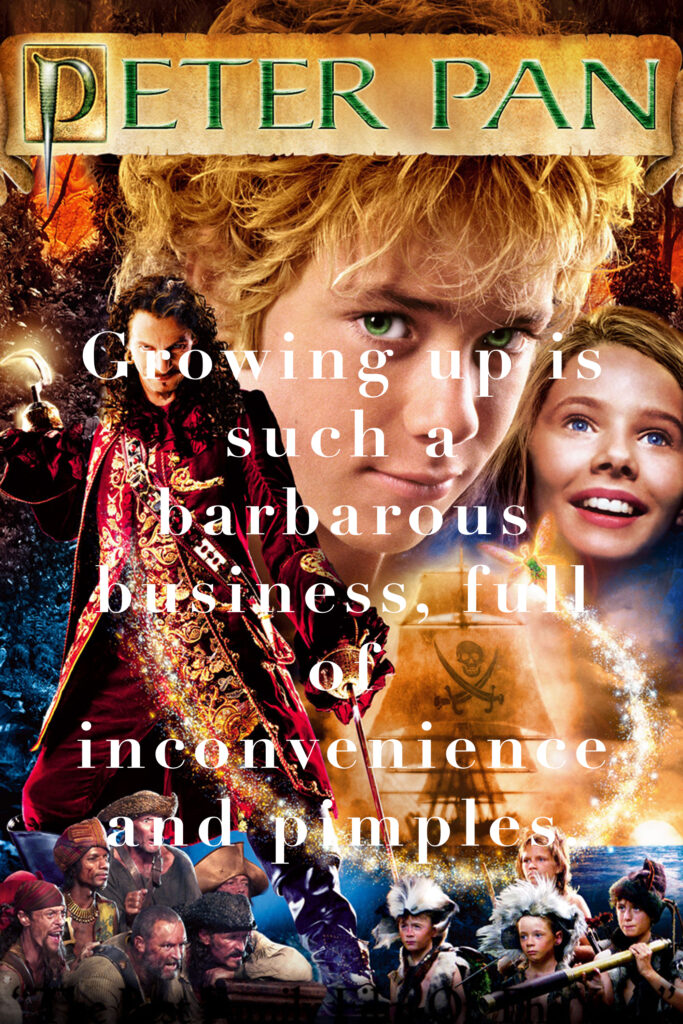
Wait a minute. In my post about it, didn’t I write that this movie had a lot of problems as an adaptation and even as a piece of storytelling on its own terms? Well…I stand by that. But, like I said, this post is about my favorite screenplays for adaptations about which I’ve blogged, not my favorite screenplays ever. And there’s something about this one that makes me keep coming back to it and feel that it deserves more than just an honorable mention. It captures J. M. Barrie’s style of humor with its blend of childlike whimsy and adult cynicism (or perhaps childish heartlessness) better than any other adaptation I’ve seen. There’s both visual humor for children and verbal wit that adults and older children can appreciate. (“I must become a man that children fear and adults respect.” “If we kill them, they shall think themselves important.”) There’s even some sly social satire. (“Novelists are not highly thought of in good society and there is nothing so difficult to marry as a novelist.”) It’s true that it feels like a modern action movie but even that feels somewhat in the spirit of the original. J. M. Barrie wrote Peter Pan in part as an affectionate parody of adventure stories that his original audience would have been familiar, like Piratical swashbucklers and Leather stocking tales. Why shouldn’t a modern Hollywood Pan be a similarly tongue-in-cheek take on modern adventure movies? It also craftily updates the characters for today’s audiences, so that, for example, the Darling children are less accepting of the ideas of fairies or flying boys than they were originally. But it doesn’t come across as embarrassed by the datedness of its material. The young characters still get excited about Cinderella for example. Its old-fashioned subject matter of pirates, “Indians” and tiny fairies probably doomed it at the box office. But if you want a Peter Pan adaptation that has a contemporary sensibility yet remains niche and nostalgic, this gets the job done nicely.[3]You only have to watch Peter Pan Live (2o14) to see one that tries and fails to meet both goals.
Even some of the script’s flaws reflect its virtues. It takes one dramatic element of the story, Wendy’s doomed love for Peter, and inflates it at the expense of others, such as theme of abandonment.[4]Actually, most of the screenplays on this list can be accused of focusing on some themes and messages of their sources at the expense of others and putting a bit of their own spin on the messages. But at least this feels like P. J. Hogan and Michael Goldenberg have a specific take on the material and aren’t just going through the motions. The same can be said about its much less ambiguous message, which makes it clear that Peter’s refusal to grow up is a tragedy and that Wendy’s acceptance of adulthood is to be applauded. Barrie arguably gave the impression that both were a tragedy or at least left the verdict of which one was up to readers and theatregoers. But then how many mainstream nonsubversive Peter Pan adaptations would even consider the possibility of not growing up being tragic? When I first heard Wendy’s accusation in the movie that Peter’s desire to always be a boy is his “biggest pretend,” I was sure this was Hogan and Goldenberg projecting their own views onto the material. Imagine my surprise to find the line comes straight from the play’s stage directions! This script was clearly written by screenwriters who read a lot of Barrie and put a lot of thought into his work.[5]The draft of the screenplay available for purchase from scriptfly.com even gives Hook some lines of dialogue from another of his plays, Dear Brutus. A crazy and misguided adaptation this certainly may be, but it’s neither a disrespectful nor a lazy one.
4. Little Women (2019) by Greta Gerwig
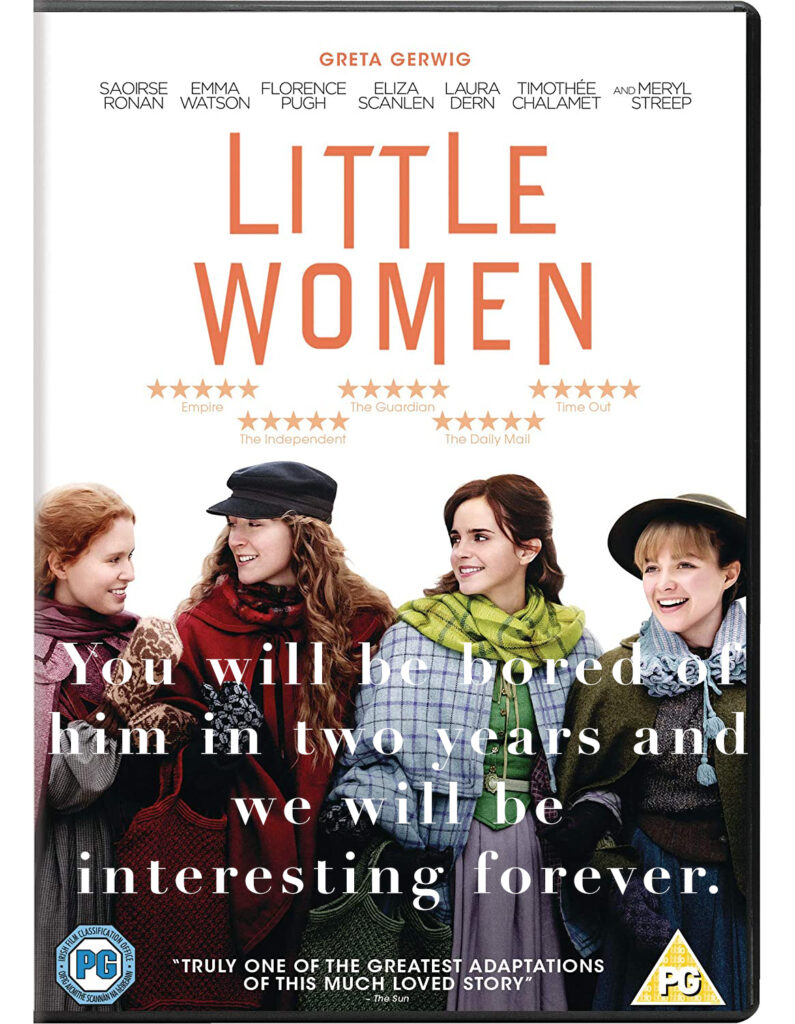
I sort of hesitate to praise this one too, though not as much as the last one. I don’t like to mention this on here, because it’s going to alienate some people, but I’m a conservative at heart. And Greta Gerwig is a liberal. Of course, pretty much all of scripts on this list were written by liberals, liberals dominating the arts world,[6]Some would say that’s because conservativism is contrary to the spirit of art. I have theories of my own, but they’re uncomplimentary to liberals and artists, so I won’t share them. but, from what I understand, she sees her screenwriting as vehicle to express her beliefs more than the other writers on this list do and attracts a fanbase to match. Part of me wishes to avoid coming across as a member of that fanbase. But another part of me believes in giving credit where it’s due. Gerwig’s script really did the best job of adapting Little Women for the cinema and it’s probably the least obnoxiously liberal movie she’s ever going to make. [7]There’s no Pro-Choice message in it for one thing. That’s because she only includes feminist messages when they fit in with the story or serve to develop the characters in some way. Clearly, she loves and respects the source material too much to do otherwise. She’s even stays true to it by including a few conservative sounding lines. (“I took care to have a few of my sinners repent.”) Maybe that’s because Gerwig’s not a completely braindead liberal just like I’m not a completely braindead conservative.[8]The flipside of that is that if you’re a liberal, it doesn’t mean you’re guaranteed to love the script. Some have criticized Gerwig for being too “white” and not radical … Continue reading
Of course, having a lot of affection for the material is nothing uncommon for a Little Women movie. Pretty much all of them were written by people who had that. But this Little Women‘s affection isn’t limited to including a lot of little details from the book, though it certainly doesn’t neglect that. (A few such are Meg being interested in flowers, Beth having a doll called Joanna and Jo having to read Belsham to Aunt March.) It goes beyond them to trying, and largely succeeding, to capture all the nuances of the characters. In the other movies, Jo and, to a lesser extent, Beth are the only ones to be fully developed. Everyone else is just in the background, occasionally getting a random dramatic scene and then fading into the background again. I can’t totally blame them for this. Jo is easily my favorite of the heroines too and since Beth is the sister closest to her, you kind of need to focus on her if you’re going to focus on Jo. Watching the movie, you get the impression Jo is Gerwig’s favorite too. But she clearly loves all the heroines. In fact, she loves all the characters, including the male ones. She even kind of loves the conservative straw(wo)men characters and tries to give them reasonable points to make.[9]Of course, her idea of that is having even the ostensibly conservative characters voice liberal preconceptions (“No one makes their own way, not really” “The whole country benefited … Continue reading Everyone feels just as developed as they should be, everything has some kind of payoff and no one feels like they were included out of obligation.[10]It’s true that the script kind of drops the ball on Beth’s character in the scenes leading up to her death, cutting all the lines from the book about how she, herself, feels and reducing … Continue reading
As much as it loves the characters though, the script’s love is not an overindulgent love that glosses over their faults. It respects the characters enough to explore their dark sides and trusts that they’ll still be lovable. Even the saintly Beth and Marmee are shown as needing to “conquer themselves,” Beth by overcoming her fear of the Laurences and Marmee by controlling her anger over the sad state of the world. It sympathizes with all the characters and the reasons they have to be bitter, and it wants viewers to do so too. But it doesn’t give them leave to wallow in bitterness. Instead, it roots for them rise above it and expects the viewers to do that too.
For all its love and respect for the source material though, this adaptation is no cut and paste job. Gerwig makes shrewd decisions repackaging it for modern audiences. She moves the scenes of the Marches gathering around to read a letter from their absent father and giving away their Christmas breakfast to a poor family, which are in the book’s first two chapters, to later in the movie when sentimentality-averse audiences will (hopefully) be already engaged. But, as I wrote above about Peter Pan, once it has them, it doesn’t come across as embarrassed by potential corniness at all.[11]If anything, it makes the first moment more sentimental than in the book by placing it after the family has just received a Christmas feast from Mr. Laurence and showing that they’re far more … Continue reading The contrasts the cuts between the past and present create are much more thoughtful than the ones in the similarly nonlinear 2018 Little Women although I enjoy that movie more. (Remember this is favorite scripts, not favorite movies.) I may have criticized the subtext behind them in my original post about the movie, as well as the twist given to the ending, which I love in theory but not in practice, and I’ll stand by that criticism. But I can’t quite bring myself to regret their existence. In particular, the ending reflects Gerwig’s love for not only the book itself, but the author and the story behind the book. Some of the lines in the script are actually quotes from Louisa May Alcott’s other writing. (“I can’t afford to starve on praise.” “I’d rather be a free spinster and paddle my own canoe.”)
3 &2. Emma (1996) and Nicholas Nickleby (2002) by Douglas McGrath
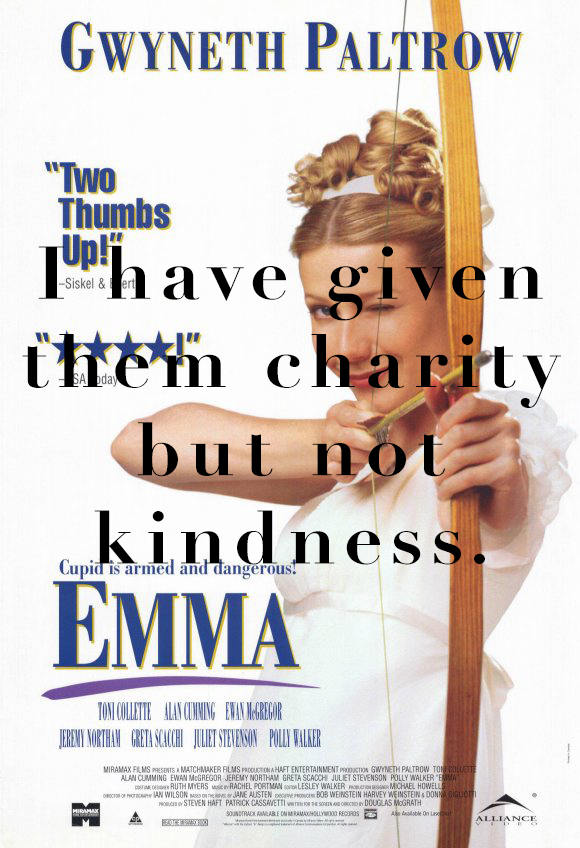
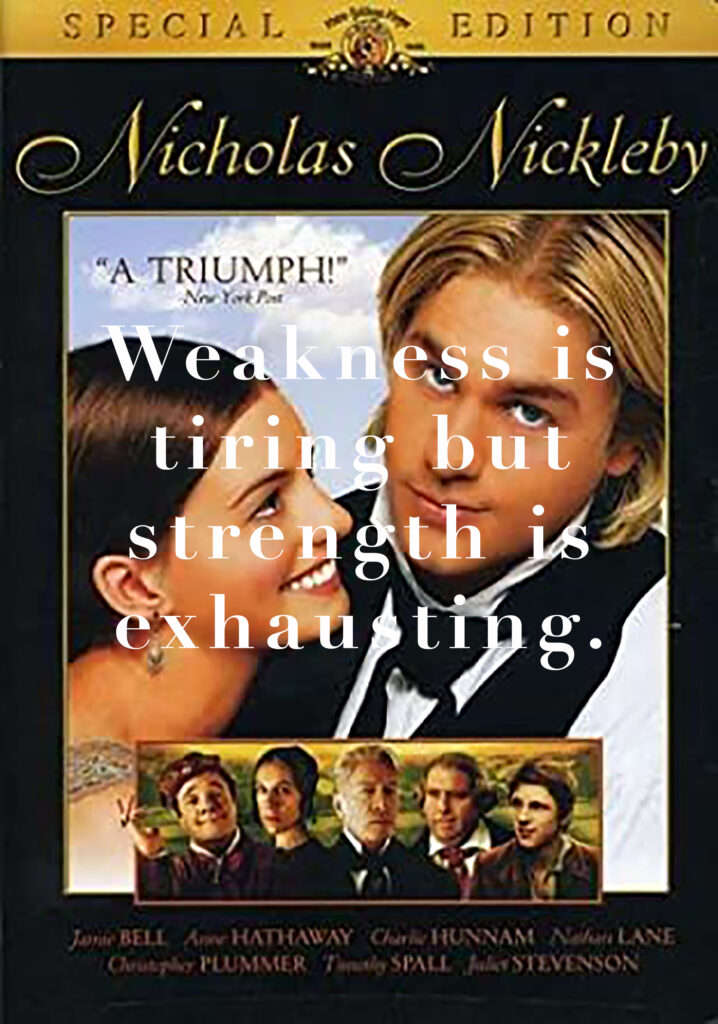
I love both of these so much I can’t choose between them[12]If it were a matter of choosing between the books that inspired them, I’d go with Nicholas Nickleby, but the fact that I’m less attached to Emma makes me more forgiving of problems with … Continue reading and, despite the great differences between Jane Austen and Charles Dickens, these two scripts from the same screenwriter share a similar spirit and much the same virtues, so it makes sense to praise them as one. It’s true that unlike some of the other adaptations on this list, they don’t even try to do justice to all the plotlines from their source materials. And some characters, such as John Knightley from Emma and Tilda Price from Nicholas Nickleby, lose pretty much all their personality. But this allows them to really give the central plots time to breathe and to really develop the leads. Neither movie feels like a giant story smushed into a short one. If I didn’t know they were based on thick books, I wouldn’t have guessed it from watching them.
It’s true that Douglas McGrath’s style isn’t a perfect fit for Austen or Dickens, being too warm for the former and not quite gritty enough for the latter. But he understands something about them that many other directors don’t.[13]I wouldn’t say screenwriters don’t get it, so arguably this is more about direction than writing. But it’s not unrelated to the script and since the director and screenwriter are … Continue reading They’re fun. More to the point, they’re funny. Too many of their adapters are too focused on Serious Social Critique to capture this vital quality. But these two scripts of McGrath’s are hilarious. They include plenty of the funniest lines from the books, trimming them when necessary, so they have maximum impact for modern audiences. (The best example of this is cutting the reference to Timour the Tartar in Mr. Crummles’s hilarious speech about his pony in Nicholas Nickleby.) They also manage to make them funny in a cinematic way as opposed to a literary way, using such devices as ironic cutaways, while always feeling grounded in the humor of the source material. (The best example of this is the montage of Emma waiting for an invitation from the Coles while maintaining that she’s not going to accept it.) Miss Bates, Harriet Smith, Mrs. Elton and the Squeers and Crummles families have seldom been funnier on the screen. I also love McGrath’s habit of cutting dialogue off midspeech and cutting to either the same character or another in midsentence as if they’re finishing the line from the previous scene. This makes it feel like the scripts are always moving forward. Energy is not something modern readers associate with Dickens or Austen, though their original readers did so. And despite what I wrote about the two scripts having a similar style and that style not being a perfect fit for either Austen or Dickens-perfection is such a high standard-they each feel funny in an Austenian and a Dickensian way respectively.[14]I’d say that Austenian comedy is based on people having to be polite to really annoying people they can’t stand. Few adaptations capture that as well as this Emma. Dickensian comedy is … Continue reading
And, hey, it’s not like being so funny kept the scripts from conveying the serious aspects of the books. Both do a great job of establishing what the protagonists’ problems are at the beginning and getting you invested in them right off the bat. And while both are full of laughs, and Nicholas Nickleby has a good bit of action and suspense too, the stories’ serious messages shine through.[15]Both admittedly put a bit of their own spin on the messages. Emma posits that the romantic leads’ flaws are what make them suited to each other and Nicholas Nickleby editorializes that the … Continue reading At their very best, they even improve on the books dramatically, Emma by having its antiheroine confess to others and not just to herself that she hasn’t been as kind to the Bates family as she’s been pretending to be and Nicholas Nickleby by giving its hero a scene where he proposes to his love interest. (In the book, only two conversations between them are actually recorded and one of them is an argument. All the arrangements for their marriage are done by go-betweens.) These scripts make the material accessible to modern audiences but they also boast some artsy features. I love the “framing devices” they use, a Victorian doll theater with dolls that correspond to characters of Nicholas Nickleby, foreshadowing the hero’s stint as an actor, and the painted globe with images of the places that are important in Emma’s small world, in keeping with the heroine being an amateur artist and suggesting the godlike power and authority she assumes for herself. Just like Austen and Dickens, McGrath achieves both artistic and entertainment value in these scripts.
1.Les Miserables (2012) by William Nicholson and Herbert Kretzmer[16]I’m including Kretzmer since I assume he wrote the English lyrics that are original to this version. I know French lyricist Alain Boulbil worked on the original song, Suddenly, which I … Continue reading
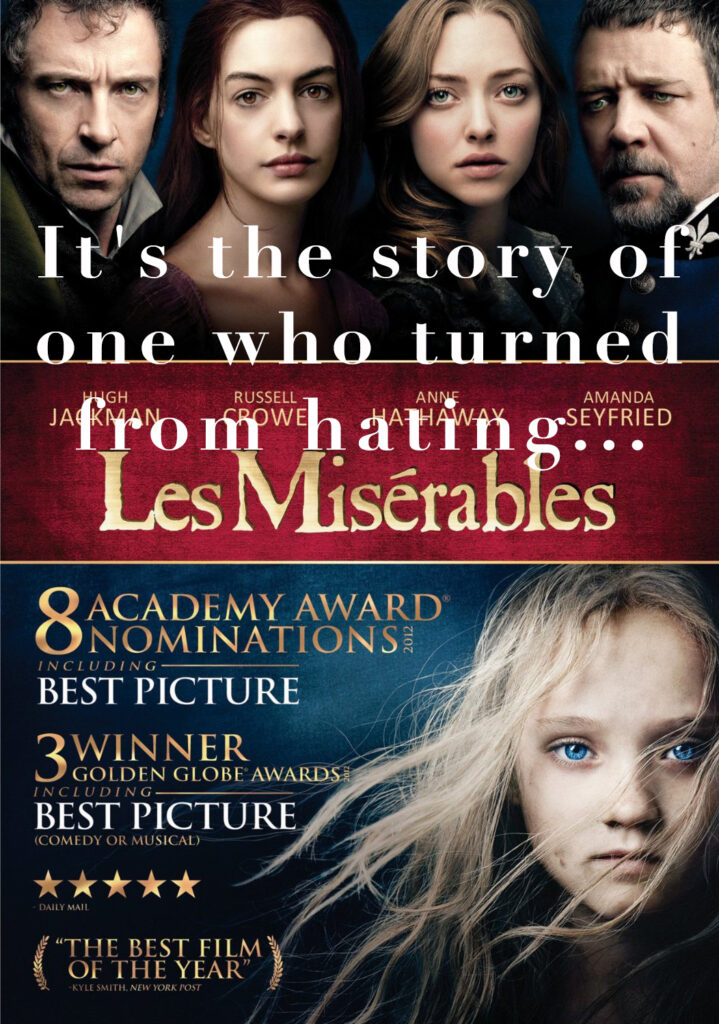
One of my first blog posts was all about how I felt this script improved on the stage musical.[17]I gather that some fans of the musical feel that it was so clearly written for the stage that any attempt to reimagine for cinema feels awkward. That is certainly a valid position to take. For what … Continue reading But I hesitate a bit to list it so high since, judging by the screenplay that’s published online, a lot of the things I love about the movie, such as Fantine impulsively slapping her detestable overseer and then immediately begging for his pardon, were the ideas of the director and possibly the cast. However, the online script does seem like an earlier draft rather than the one used for shooting.[18]Its version of Lovely Ladies, in particular, feels highly experimental and the final movie did well to bring it closer to the stage version. It’s not unheard of for studios to put out drafts of the screenplays out for award consideration rather than the shooting scripts.[19]I don’t get why. Isn’t it like an admission that they were better than the final product? But I’m grateful for the insight these drafts given into the creative process. Even if the online version was used for shooting, many of the movie’s best ideas, such as Valjean lifting a fallen mast and flinging it defiantly in front of Javert in the first scene, the expanded role of the barmaid at Café Musain, and the friendship between Gavroche and Courfeyrac, are already in there. William Nicholson at least got the ball rolling in the right direction, even if others were responsible for the brilliant conclusion.[20]And there are some good things in the online screenplay that didn’t make the final cut like a brief but memorable moment early in the script, with some basis in the book, where Jean Valjean … Continue reading
In my original blog post, I praised the script for all the ways it brought the story and characters back to Victor Hugo’s original book,[21]I didn’t even mention fun little details it includes like the Thernardiers having a cat or Gavroche sleeping in a dilapidated elephant statue. and I’ll stand by that. But I fear I may have given the impression that I only considered the musical good in that it followed the book, which is far from the truth.[22]It’s also worth noting that there’s one way the stage musical is closer to the book than the movie. Part of Hugo’s tragic vision seems to have been a really interesting villain, … Continue reading In fact, if William Nicholson’s screenplay had been solely a literary adaptation and not bothered with the musical, it could not have been half as great. As much as I love how every scene furthers the plot without wasting a moment, it would have been far too fast paced to give us time to get inside the characters’ heads without such awe-inspiring songs as I Dreamed a Dream, Who Am I?, Stars, On My Own or Bring Him Home. They convey in one scene what would normally take several. Most movie adaptations of Les Misérables, as opposed to miniseries, are able to focus on only a few of the many great characters, mostly Valjean and Javert. And even those adaptations often end with Javert’s suicide and Marius and Cosett’s union, completely cutting the book’s final dramatic section. The musical doesn’t include every scene from the book,[23]If it did, probably no one would want to watch it. but it gives a far better idea of the overall story than pretty much any other short adaptation. And while it doesn’t fully develop every major character, few of them feel underdeveloped as they sometimes do. Here the screenplay does the stage libretto one better by properly developing Marius, a character who did feel underdeveloped despite having a good amount of stage time.[24]He’s still not as rounded and interesting a character as in the book, but still definitely a step in the right direction. And while it may not develop Cosette herself more, it does develop her vital relationship with Jean Valjean.
Nicholson not only includes as many of the best parts of both the book and the stage play as he can, but he also brings great ideas of his own to the table, mainly original staging for the songs. Who can forget Jean Valjean kneeling before an altar in the bishop’s church during the first part of his Soliloquy [25]The final movie would make this even better by having him then angrily stride away from it, and then stop, stricken, perfectly reflecting the powerful struggle between guilt and resentment inside him. or Javert singing Stars from atop a building, overlooking Paris, believing himself to have the moral high ground? Then there’s Cosette having her bedroom window open during the first part of In My Life, Jean Valjean closing it during his part, symbolizing his desire to keep her to himself, and her then going outside by herself to meet Marius. And Javert riding past a group of beggars during the line “the righteous (used ironically) hurry past” and the following ominous verse about “a reckoning still to be reckoned,” foreshadowing the insurrection in the movie’s final act, being defiantly addressed to his back. Both of those would be hard to do on stage (In My Life/A Heart Full of Love traditionally takes place entirely in the garden), but they feel like they were always meant to be that way.
None of which is to say I consider either the book or the stage musical to be defunct now because of this adaptation. After all, I’m more of a fan of the literary medium than the cinematic medium. And while I wouldn’t say I’m more of a fan of theater than the cinema, it’s arguably more interesting. But if I had to choose between recommending the book, the play or the movie to someone who had never heard the story before, I’d go with the last one. And I’m not sure I can say that of any other adaptation on this list. The fact that it’s really an adaptation of two things that were already great makes the feat even more impressive.
Bibliography
love-and-friendship-2016.pdf (scriptslug.com)
little-women-2020-script-pdf.pdf
LM SCRIPT 13TH MARCH 2012.fdx (squarespace.com)
References
| ↑1 | If I had, the scripts for pretty much every episode of The Storyteller would have to be included, but I’m not sure about the libretto for the 2000 staging of Peter Pan. I love it more than the Peter Pan adaptation I am including in this list, but mostly because it brings it closer to J. M. Barrie’s play and further away from the 1950s musical; it arguably doesn’t have a special quality of its own. The 1982 Nicholas Nickleby is one that I’d feel like I should include because it’s such a comprehensive and intelligent adaptation, but somehow I just don’t love it. |
|---|---|
| ↑2 | In Stillman’s defense, the dramatic problems come from the source material, Lady Susan, though another adaptation might have worked around them better. In Austen’s defense, Lady Susan appears to have been a rough draft she never intended to publish. |
| ↑3 | You only have to watch Peter Pan Live (2o14) to see one that tries and fails to meet both goals. |
| ↑4 | Actually, most of the screenplays on this list can be accused of focusing on some themes and messages of their sources at the expense of others and putting a bit of their own spin on the messages. |
| ↑5 | The draft of the screenplay available for purchase from scriptfly.com even gives Hook some lines of dialogue from another of his plays, Dear Brutus. |
| ↑6 | Some would say that’s because conservativism is contrary to the spirit of art. I have theories of my own, but they’re uncomplimentary to liberals and artists, so I won’t share them. |
| ↑7 | There’s no Pro-Choice message in it for one thing. |
| ↑8 | The flipside of that is that if you’re a liberal, it doesn’t mean you’re guaranteed to love the script. Some have criticized Gerwig for being too “white” and not radical enough in her feminism. You’d think this would show her that the Left demands just as much rigid conformity as the Right does, but enough of my carping. |
| ↑9 | Of course, her idea of that is having even the ostensibly conservative characters voice liberal preconceptions (“No one makes their own way, not really” “The whole country benefited from the system”) but, oh well, I appreciate the thought. |
| ↑10 | It’s true that the script kind of drops the ball on Beth’s character in the scenes leading up to her death, cutting all the lines from the book about how she, herself, feels and reducing her to an object for the other characters to cry over. And it seems to have rather mixed feelings about Prof. Bhaer, emphasizing some elements of his character to the exclusion of others. But these are the exceptions that prove the rule. |
| ↑11 | If anything, it makes the first moment more sentimental than in the book by placing it after the family has just received a Christmas feast from Mr. Laurence and showing that they’re far more excited about the letter. |
| ↑12 | If it were a matter of choosing between the books that inspired them, I’d go with Nicholas Nickleby, but the fact that I’m less attached to Emma makes me more forgiving of problems with its adaptations |
| ↑13 | I wouldn’t say screenwriters don’t get it, so arguably this is more about direction than writing. But it’s not unrelated to the script and since the director and screenwriter are one and the same, I don’t feel as bad about bringing up the direction in this case. |
| ↑14 | I’d say that Austenian comedy is based on people having to be polite to really annoying people they can’t stand. Few adaptations capture that as well as this Emma. Dickensian comedy is trickier to define, but this Nicholas Nickleby definitely captures it. |
| ↑15 | Both admittedly put a bit of their own spin on the messages. Emma posits that the romantic leads’ flaws are what make them suited to each other and Nicholas Nickleby editorializes that the heroes learned that “family need not be defined merely as those with whom they share blood, but as those they would give blood for.” They’re still a lot of less spin heavy than Peter Pan or even Little Women. |
| ↑16 | I’m including Kretzmer since I assume he wrote the English lyrics that are original to this version. I know French lyricist Alain Boulbil worked on the original song, Suddenly, which I don’t undervalue, but crediting all three seemed too much. |
| ↑17 | I gather that some fans of the musical feel that it was so clearly written for the stage that any attempt to reimagine for cinema feels awkward. That is certainly a valid position to take. For what it’s worth though, I first heard the music long before the movie was being made and when I listened to it, I didn’t imagine a stage production. It always said “movie” to me. |
| ↑18 | Its version of Lovely Ladies, in particular, feels highly experimental and the final movie did well to bring it closer to the stage version. |
| ↑19 | I don’t get why. Isn’t it like an admission that they were better than the final product? But I’m grateful for the insight these drafts given into the creative process. |
| ↑20 | And there are some good things in the online screenplay that didn’t make the final cut like a brief but memorable moment early in the script, with some basis in the book, where Jean Valjean looks in on a peasant family in Digne. “A father at a table by lamplight, his young wife before him, his children on either side. Nothing special and yet everything he’s never had.” |
| ↑21 | I didn’t even mention fun little details it includes like the Thernardiers having a cat or Gavroche sleeping in a dilapidated elephant statue. |
| ↑22 | It’s also worth noting that there’s one way the stage musical is closer to the book than the movie. Part of Hugo’s tragic vision seems to have been a really interesting villain, like Javert or Frollo, will always die, but a regular run-of-the-mill monster, like Thenardier or Phoebus, will get off relatively scot-free. The Thernardiers’ final song in the musical, Beggar at the Feast, reflected this, but the movie version subverted it a little by having the singers be forcibly ejected from said feast. Even the end of the movie’s Master of the House had Thenardier receive a little comeuppance to his wife’s delight. As an admirer of Hugo, I have to acknowledge this, but I also have to admit enjoying it. |
| ↑23 | If it did, probably no one would want to watch it. |
| ↑24 | He’s still not as rounded and interesting a character as in the book, but still definitely a step in the right direction. |
| ↑25 | The final movie would make this even better by having him then angrily stride away from it, and then stop, stricken, perfectly reflecting the powerful struggle between guilt and resentment inside him. |
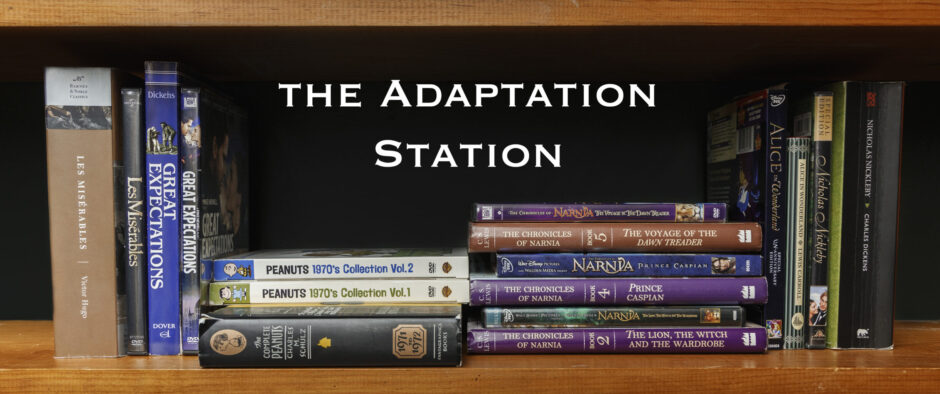
Excellent post! I loved this recap. A few of these have been on my list to see for a long time. I realize you are focusing on screenplays and not the movies themselves, but I appreciate your attention to theme and character development as those are not a focus of most movie reviewers. I do believe they give a better indication of the quality of a movie than simple plot summaries do.